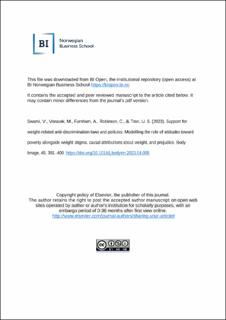Support for weight-related anti-discrimination laws and policies: Modelling the role of attitudes toward poverty alongside weight stigma, causal attributions about weight, and prejudice
Journal article, Peer reviewed
Submitted version
Permanent lenke
https://hdl.handle.net/11250/3108739Utgivelsesdato
2023Metadata
Vis full innførselSamlinger
Sammendrag
In the present study, we sought to position support for weight-related anti-discrimination laws and policies within a broader political and socioeconomic context. Specifically, we hypothesised that individualistic (rather than structural) anti-poverty attitudes would provide the basis for negative weight-related dispositions. To test this hypothesis, we asked 392 respondents from the United Kingdom to complete measures of support for weight-related anti-discrimination laws and policies, attributions about the causes of being larger-bodied, and weight-related stigma and prejudice. Path analysis with robust maximum likelihood estimation indicated that greater individualistic anti-poverty attitudes were significantly and directly associated with lower support for weight-related anti-discrimination laws and policies. This direct association was also significantly mediated by weight-related stigma and via a serial mediation involving both weight-related stigma and prejudice. Although greater individualistic anti-poverty attitudes were significantly associated with greater personal attributions for being larger-bodied, the latter did not emerge as a significant mediation pathway. The present findings highlight the importance of considering broader political and socioeconomic contextual factors that may provide a basis for the development, maintenance, and manifestation of negative weight-related dispositions.

